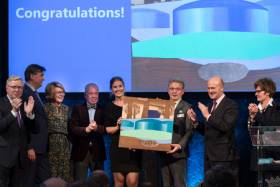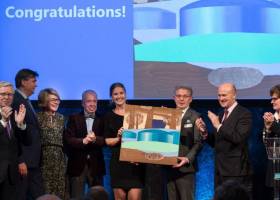Displaying items by tag: ESPO Award 2019
ESPO Jury Puts Dublin Port Among Finalists for Societal Integration of Ports Award
Dublin Port is among four ports shortlisted for the 11th European Sea Ports Organisation (ESPO) Award on Societal Integration of Ports.
The Irish port is in competition with Dover, Stockholm and Union des Ports de France (UPF). The jury selected these four applications from a total of nine submissions.
This year’s theme for the Award is “Transparency and the role of social media in reaching out to the local community”.
Using social media as a new way of communicating and demonstrating a high level of transparency about operational achievements, future strategies and environmental challenges and performance is becoming increasingly important for European ports who can only function and further develop if they receive the licence to operate from the local citizens. The ESPO Award 2019 will therefore award the port authority which has developed a successful strategy to reach out to the local community and is succeeding in directly communicating with the port citizens.
“On behalf of the jury I wish to thank all the ports who participated in this year’s ESPO Award process and congratulate the shortlisted ports. We look forward to meeting them prior to finalising our choice of winner for 2019”, said Pat Cox, Chairman of the ESPO award jury.
The winner of the 11th ESPO Award will be announced during the Award Ceremony taking place on 13 November in Brussels. The shortlisted projects will be presented on the ESPO website in the running up to this event. All nine submissions will be presented in a special dedicated brochure to be published on 13 November.
The ESPO Award was established in 2009 to promote innovative projects of port authorities that improve societal integration of ports, especially with the city or wider community in which they are located. In this way, the Award wants to stimulate the sustainable development of European ports and their cities.
Previous winners of the Award are the Port of Gijón (2009), the Port of Helsinki (2010), the Ports of Stockholm (2011), the Port of Genoa (2012), the Port of Antwerp (2013), the Port of Koper (2014), the Port of Dublin (2015), BremenPorts (2016), Guadeloupe Ports Caraïbes (2017) and Port of Rotterdam (2018).
ESPO Award 2019: Is Your Port Successful in Reaching Out in a Direct & Transparent Way to Port Citizens?
#ports - The theme of this year's European Sea Ports Organisation (ESPO) Award on Societal Integration of Ports is “Transparency and the role of social media in reaching out to local community”.
The ESPO Award 2019 will go to the port authority that has developed a successful strategy to reach out to the local community and is succeeding in directly communicating with the port citizens. Using social media as a new way of communication and demonstrating a high level of transparency about operational achievements, future strategies and environmental challenges and performance is becoming increasingly important for European ports who can only function and further develop if they receive the licence to operate from the local citizens.
Direct and transparent communication must make it possible for every citizen to follow the port in its successes and challenges. Moreover, it allows the dialogue with the citizens and, ideally, makes every citizen an ambassador for its port.
The ESPO Award was established in 2009 to promote innovative projects of port authorities that improve societal integration of ports, especially with the city or wider community in which they are located. In this way, the Award aims to stimulate the sustainable development of European ports and their cities.
Project submissions have to reach the ESPO secretariat by Friday 28 June 2019 at the latest. The application form and the terms of reference are available on the ESPO Website.
The 11th ESPO Award will be officially handed out during an Award Ceremony and Dinner, which will take place in November in Brussels.
Last year the Port of Rotterdam, was winner of the ESPO Award and three years previously Dublin Port took the honour.






























































